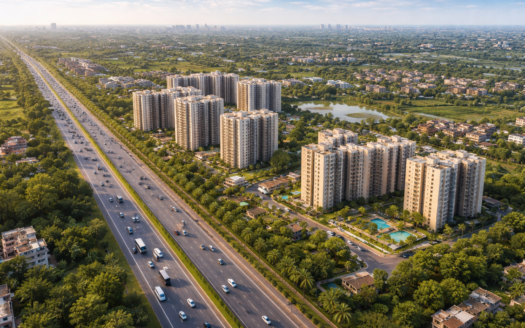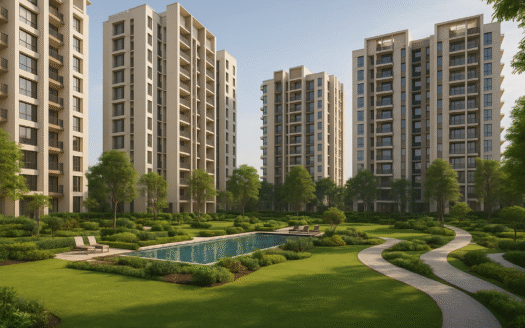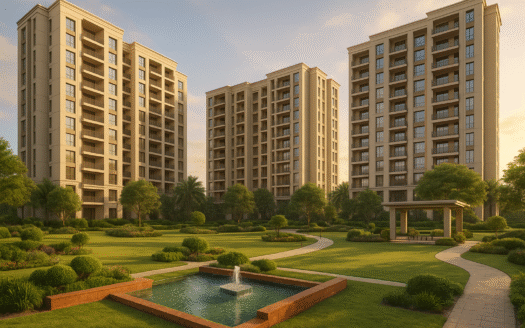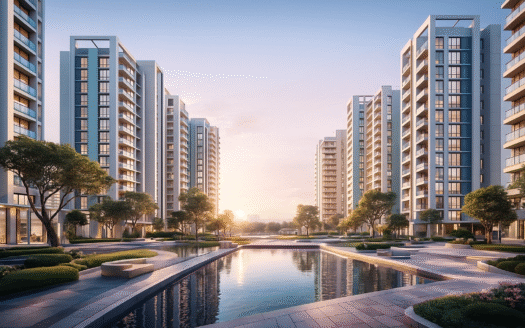Predicting the Next Emerging Real Estate Hubs in India (2025–2030): Where Smart Investors Should Look Next
Why Predicting Emerging Real Estate Hubs Matters for Buyers & Investors
India’s property market is entering a decisive new phase. Over the next five years, large-scale infrastructure, shifting workplace behaviour, and policy-led housing programmes will redraw the investment map. Knowing where the next centres of growth will appear between 2025 and 2030 can help you buy earlier, hold smarter, and realise stronger returns. Prices in traditional metros have climbed steeply, and saturation is evident in many prime precincts. That is pushing both developers and buyers towards Tier-2 and well-connected suburban nodes that now offer credible employment ecosystems, better civic amenities, and far more liveable communities at prices that still make sense.
Government focus is a central catalyst. The Smart Cities Mission, housing incentives under schemes such as PM Awas Yojana, and the expansion of industrial and logistics corridors under multi-modal plans are accelerating real estate readiness outside legacy markets. As expressways, metro lines, airports, and freight networks come online, land values typically re-rate, absorption improves, and rental demand deepens. Simultaneously, hybrid work and digitisation are encouraging end-users to prioritise larger homes, green spaces, and community infrastructure—needs that emerging cities and new-age townships are well positioned to satisfy.
For investors, timing and selection remain crucial. Entering a micro-market just before a new connectivity link reaches critical milestones is often where the sharpest price gains occur. Understanding which cities are moving from “promise” to “performance” can help you balance capital appreciation with rental yield, and diversify beyond crowded metros. Whether you are an NRI diversifying across India, a first-time millennial buyer, or a seasoned investor building a long-term portfolio, this Get My Ghar guide shows you where to look next, what to track, and how to structure decisions so you stay ahead of the curve.
Key Takeaways on Emerging Real Estate Hubs: What You Will Learn from This Guide
Legal and Regulatory Confidence
How RERA, master plans, and city-level approvals shape risk, safeguard buyers, and influence project timelines and pricing momentum.
Infrastructure and Policy Catalysts
Which expressways, industrial corridors, metro lines, and logistics parks are likely to unlock demand and reprice surrounding micro-markets.
Prices, Yields, and ROI Signals
How to read price bands, absorption trends, and rental activity to gauge near-term appreciation and sustainable long-term returns.
Practical, City-Specific Moves
Actionable frameworks to shortlist neighbourhoods, time entries around milestones, and leverage Get My Ghar for verified data and pre-launch access.
The Rise of Tier-2 Powerhouses: Affordable, Connected, and Promising
Why Tier-2 Cities Are the Future
As costs escalate in Mumbai, Delhi NCR, Bengaluru, and Hyderabad, value is migrating to cities where land remains affordable and infrastructure is scaling rapidly. Tier-2 markets are no longer mere satellite options; they are evolving into self-sustaining growth centres with IT/ITES parks, manufacturing clusters, healthcare hubs, and high-quality education. State governments are actively courting investment with industrial policies, simplified approvals, and incentives that encourage diversified employment. For buyers, that translates into modern housing at rational prices; for investors, it offers an attractive entry point with room for appreciation as jobs, amenities, and connectivity compound.
Investor sentiment often follows three early signals: employment anchors (tech parks, SEZs, and factories), transport upgrades (metro, airport expansion, and high-capacity roads), and lifestyle infrastructure (schools, hospitals, malls, and leisure). When all three align, price visibility improves and the transition from “aspirational” to “established” tends to be swift. Over 2025–2030, the cities below are set to benefit from multiple such triggers.
Top Performing Tier-2 Cities to Watch
| City | Average Property Price (₹ per sq. ft.) | Key Growth Drivers | ROI Potential (2025–2030) |
| Indore | 5,000–6,000 | IT and manufacturing hubs, expanding metro network, clean-city track record | High |
| Coimbatore | 4,500–5,500 | Industrial growth, textile and engineering base, smart-city upgrades | Moderate to High |
| Surat | 6,000–7,500 | Diamond and textile industries, metro build-out, logistics connectivity | High |
| Bhubaneswar | 4,000–5,000 | Infrastructure investment, SEZ development, education and services | High |
| Lucknow | 5,500–6,500 | Metro network, logistics corridor, healthcare and government employment | High |
These markets balance affordability with strong demand drivers. Entry costs remain accessible compared with Tier-1 cores, while lifestyle quality and civic services are rising. For end-users, that means more space and better amenities; for investors, it signals scope for steady rental demand now and capital appreciation as infrastructure matures.
Infrastructure-Driven Growth: The Backbone of Emerging Markets
Transport Corridors and Connectivity
Infrastructure is the single most powerful lever in real estate. High-speed corridors compress commute times, bring job hubs within reach, and open previously peripheral land for development. As freight and passenger networks scale, ancillary ecosystems—warehousing, retail, offices, and social infrastructure—follow. Between 2025 and 2030, watch projects that improve inter-state and intra-city travel times, particularly those linking industrial zones to ports and airports. Dedicated freight and logistics parks typically catalyse housing demand in nearby residential nodes, especially where price points suit mid-income professionals and small business owners.
Smart Cities and Technology Integration
The Smart Cities Mission is not merely a badge; it is about intelligent transport, digital governance, energy-efficient utilities, and resilient urban design. Cities such as Surat, Pune, Bhopal, and Ahmedabad have already showcased tangible improvements in traffic management, surveillance, e-services, and public spaces. These upgrades reduce friction in daily life and attract mobile talent. For investors, technology-enabled cities tend to exhibit better maintenance standards, more reliable civic services, and clearer long-term liveability—factors that influence rental absorption and resale liquidity.
What to Track Between 2025 and 2030
Focus on measurable milestones rather than announcements. Three stages often align with price movement: project award and land acquisition (early mover stage), 50–70% physical progress (re-rating stage), and operational launch (mature stage). Priority corridors to monitor include the Delhi–Mumbai Expressway and related logistics spurs, the Mumbai–Ahmedabad high-speed rail and its peripheral nodes, the expanding metro webs in major state capitals, suburban rail in large metros, and ring roads that unlock outer belts. Layer this with planned industrial parks and warehousing clusters to identify residential catchments likely to see the sharpest demand uplift.
A simple rule of thumb: if a micro-market gains faster, more reliable access to a significant employment node and offers liveable amenities within a 15–30 minute commute, both rental and ownership demand typically strengthen. Combine that with a credible developer and balanced supply, and your downside reduces meaningfully.
 Emerging Metro Extensions and Suburban Hotspots
Emerging Metro Extensions and Suburban Hotspots
Expanding City Boundaries
Even within established metros, the centre of gravity is shifting. As core business districts densify and prices push out end-users, developers are assembling large land parcels in suburban belts with upcoming metro lines, expressways, and ring-road access. These precincts—once seen as pure affordability plays—are now home to Grade-A residential towers, premium schools, healthcare facilities, and managed retail. The sweet spot is where improved access meets master-planned development, giving buyers a cleaner slate, better layouts, and community amenities at more rational rates than inner-city addresses.
The New-Age Homebuyer Influence
Millennials and Gen Z buyers are defining the brief: integrated townships with open spaces, walking trails, co-working lounges, EV charging, and strong security. Projects that combine clubhouses, learning pods, and wellness features tend to record faster absorption. For investors, this preference translates into higher stickiness and lower vacancy. It also favours formats such as 2 and 2.5 BHKs with efficient, storage-friendly plans and balconies, plus managed rental programmes that appeal to professionals.
Suburban Corridors to Watch
| Metro Region | Emerging Suburbs | Average Price (₹ per sq. ft.) | Growth Outlook |
| Mumbai | Navi Mumbai, Thane, Kalyan | 9,000–12,000 | High |
| Bengaluru | Whitefield, Sarjapur, Devanahalli | 8,000–10,500 | High |
| Delhi NCR | Noida Extension, Dwarka Expressway | 7,500–9,000 | Very High |
| Hyderabad | Kompally, Medchal | 6,000–7,500 | High |
| Chennai | Pallavaram, Sholinganallur | 6,500–8,000 | Moderate to High |
What differentiates these nodes is the confluence of job access and lifestyle. For example, IT corridors with upcoming metro stations, or logistics belts connected to new expressways and ring roads, are drawing first-time buyers and upgraders alike. Investors should map commute times to major employment hubs at peak hours, verify possession timelines, and prefer developers with strong construction and delivery records. Township formats with on-site retail and learning facilities often command a small premium—but they also preserve value better through cycles.
Investment Strategies for 2025–2030: How to Identify the Right Market
Research and Timing
Smart investors run on data. Start with macro filters: employment creation, population inflow, and planned connectivity. Narrow to micro-markets where a new metro line, expressway interchange, or suburban rail station is under construction—not just announced. Track official progress updates and site activity; price discovery tends to happen 6–18 months before operational launch. Validate demand through primary indicators: site footfall on weekends, sales velocity of comparable projects, and occupancy in nearby completed phases. Where multiple projects are launching simultaneously, choose phase-wise developments with proven construction pace to reduce delivery risk.
Diversification and Risk Management
Balance your portfolio across city types (one Tier-1 suburb, one strong Tier-2 city), property formats (apartment plus plotted development or villa plot), and ticket sizes. This hedges against regulatory delays, supply spikes, or localised slowdowns. For rental stability, prioritise projects within 15–20 minutes of large job centres or education clusters. For capital gains, look for per-sq-ft prices at a discount to established neighbouring nodes despite comparable connectivity timelines. Always stress-test for interest rate changes and allow a contingency for fit-outs and stamp duty.
Work with Trusted Advisors
Information asymmetry is real in emerging hubs. A verified platform such as Get My Ghar provides access to pre-launch inventories, clean title checks, stage-wise construction monitoring, and pricing intelligence that retail buyers rarely see. Use this to negotiate gated-community units in early phases, secure inventory on better floors or views, and structure payment schedules that protect cash flow. If you are an NRI, insist on clear power-of-attorney documentation, transparent escrow practices, and RERA-registered projects. With the right partner, you can move earlier, manage risk better, and exit cleaner when the time is right.
Sample Entry Checklist: confirm RERA details, review the city master plan, map transport milestones, compare three comparable projects, estimate total cost of ownership, and run rent-minus-EMI feasibility at conservative occupancy.
 How Early Investment in Emerging Hubs Transformed an Investor’s Portfolio
How Early Investment in Emerging Hubs Transformed an Investor’s Portfolio
When Anita Rao, a 38-year-old professional from Chennai, looked beyond her home city in 2019, she shortlisted Lucknow’s Shaheed Path corridor. Back then, a well-located 2 BHK was trading around ₹4,200 per sq. ft., and many dismissed the market as too early. Anita studied the metro expansion, ring-road connectivity, and the growth of healthcare and government employment. Guided by a Get My Ghar consultant, she chose a RERA-registered project with strong construction credentials and a township-style amenity mix.
Five years on, the metro has extended, commute times have shrunk, and new offices and hospitals have opened along the corridor. Prices have crossed ₹6,500 per sq. ft., representing about 55% appreciation. Just as importantly, rental demand has tightened as professionals seek well-managed communities close to work and transit. Anita now enjoys a steady rent that offsets a significant portion of her EMI while the asset continues to compound in value. The early entry, backed by verifiable data and credible delivery, outperformed some of her Tier-1 exposures and rebalanced her portfolio. Her journey underlines a simple truth: in emerging hubs, informed timing and trusted guidance can create an edge that is hard to replicate later.
FAQs on Emerging Real Estate Hubs in India (2025–2030)
Which Indian cities are expected to become major real estate hubs by 2030?
Indore, Surat, Lucknow, Coimbatore, and Bhubaneswar stand out for connectivity upgrades, job creation, and improving civic infrastructure.
Are Tier-2 cities better investment options than metros?
Often, yes. Lower entry costs, improving amenities, and rising demand can deliver stronger percentage gains, especially near upcoming transport nodes.
What role do government policies play in emerging hubs?
City master plans, Smart Cities initiatives, and industrial corridors shape zoning, infrastructure spend, and the viability of new residential catchments.
Is it safe for NRIs to invest in emerging cities?
Yes—provided you choose RERA-registered projects, verify titles, and work with trusted partners that manage documentation and possession milestones.
When is the best time to invest in upcoming hubs?
Typically just before or during key connectivity completion. Prices tend to accelerate once operations begin and occupancy surges.
How can I identify the right emerging city for investment?
Track infrastructure progress, observe absorption and rentals, compare per-sq-ft pricing to adjacent mature nodes, and consult platforms like Get My Ghar.
What yields should I expect in these markets?
Gross residential yields commonly range from 2.5% to 4.5% depending on city, project quality, and proximity to employment and transit.
Pro Tip on Investing in Emerging Real Estate Hubs
Before you visit sample flats, study the city’s development blueprint. Read the latest master plan, locate proposed stations or interchanges, and note implementation stages. Then filter projects by a 2–4 km radius around confirmed transport nodes and institutional anchors such as tech parks, universities, and major hospitals. Prioritise developers with on-time delivery records and choose inventory in phases aligned with tangible construction progress. This approach, paired with Get My Ghar’s verified data, helps you capture upside from infrastructure-led repricing while keeping execution risk in check.
Conclusion & Next Steps: How to Act on Emerging Real Estate Hubs Today
The 2025–2030 cycle will reward investors who blend conviction with discipline. Focus on cities and suburbs where employment, transport, and lifestyle infrastructure are converging. Enter a touch early, back credible developers, and hold through commissioning and stabilisation to realise full value. To fast-track your shortlisting, lean on Get My Ghar for curated projects, pre-launch access, and research-backed guidance. Whether you are buying your first home or rebalancing a portfolio, the next wave of India’s real estate growth is already forming—position yourself to ride it with confidence.















